Leadership and Operational Management at Marks & Spencer: A Report
VerifiedAdded on 2020/10/05
|14
|4263
|171
Report
AI Summary
This report analyzes the leadership and operational management practices at Marks & Spencer (M&S), a multinational retail company. It defines and compares the roles and characteristics of leaders and managers, exploring their functions in various organizational situations, such as risk-taking and decision-making. The report examines different leadership theories, including classical management, transactional leadership, situational leadership, systems leadership, and contingency leadership, assessing their advantages and disadvantages. Key approaches to operations management are discussed, highlighting the roles of managers and leaders in operational activities like product design, planning, and supply chain management. Furthermore, the report emphasizes the value and importance of operational management in achieving business objectives, and it discusses the impact of business environment factors on decision-making and operational processes. The report uses M&S as a case study to illustrate these concepts, providing a comprehensive overview of leadership and management in a retail context.
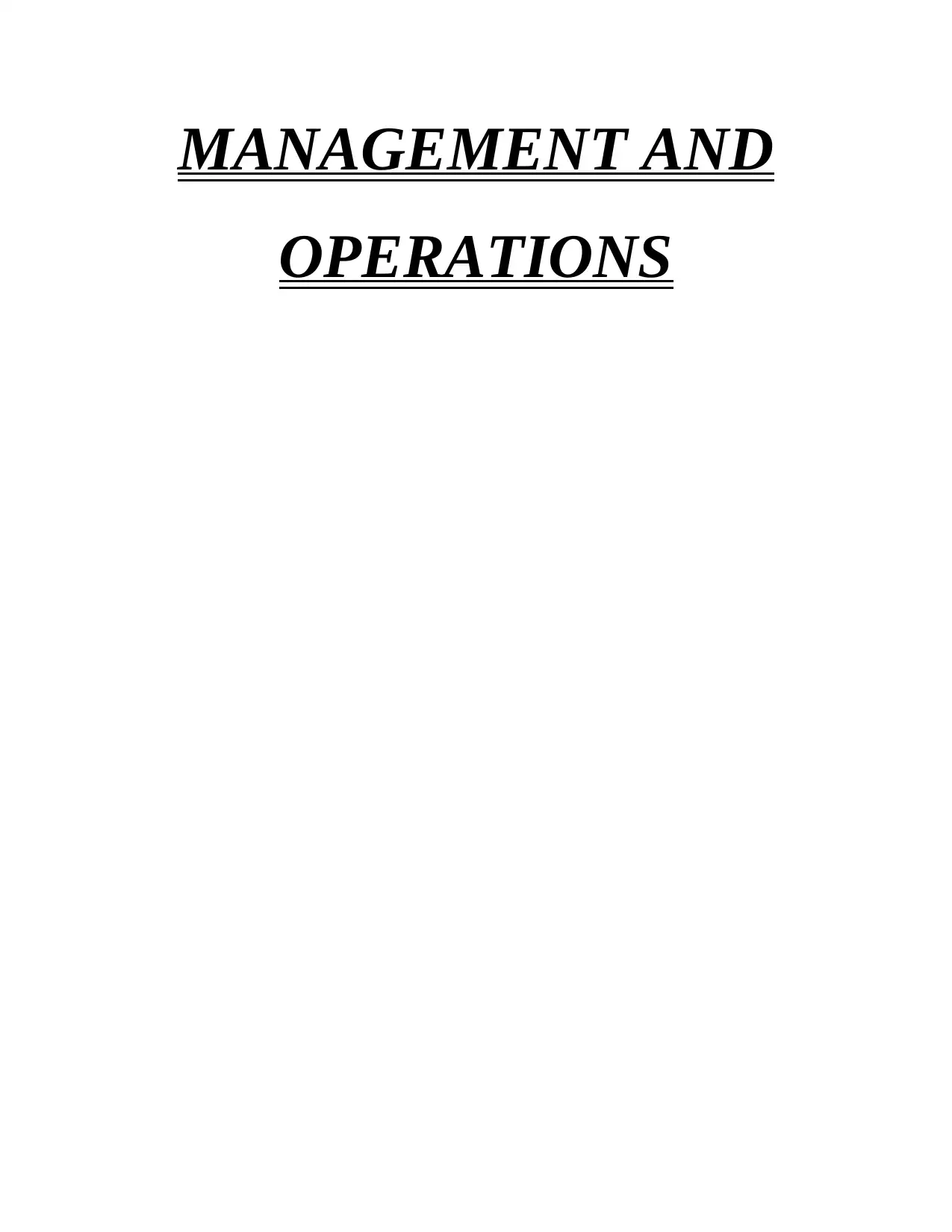
MANAGEMENT AND
OPERATIONS
OPERATIONS
Paraphrase This Document
Need a fresh take? Get an instant paraphrase of this document with our AI Paraphraser
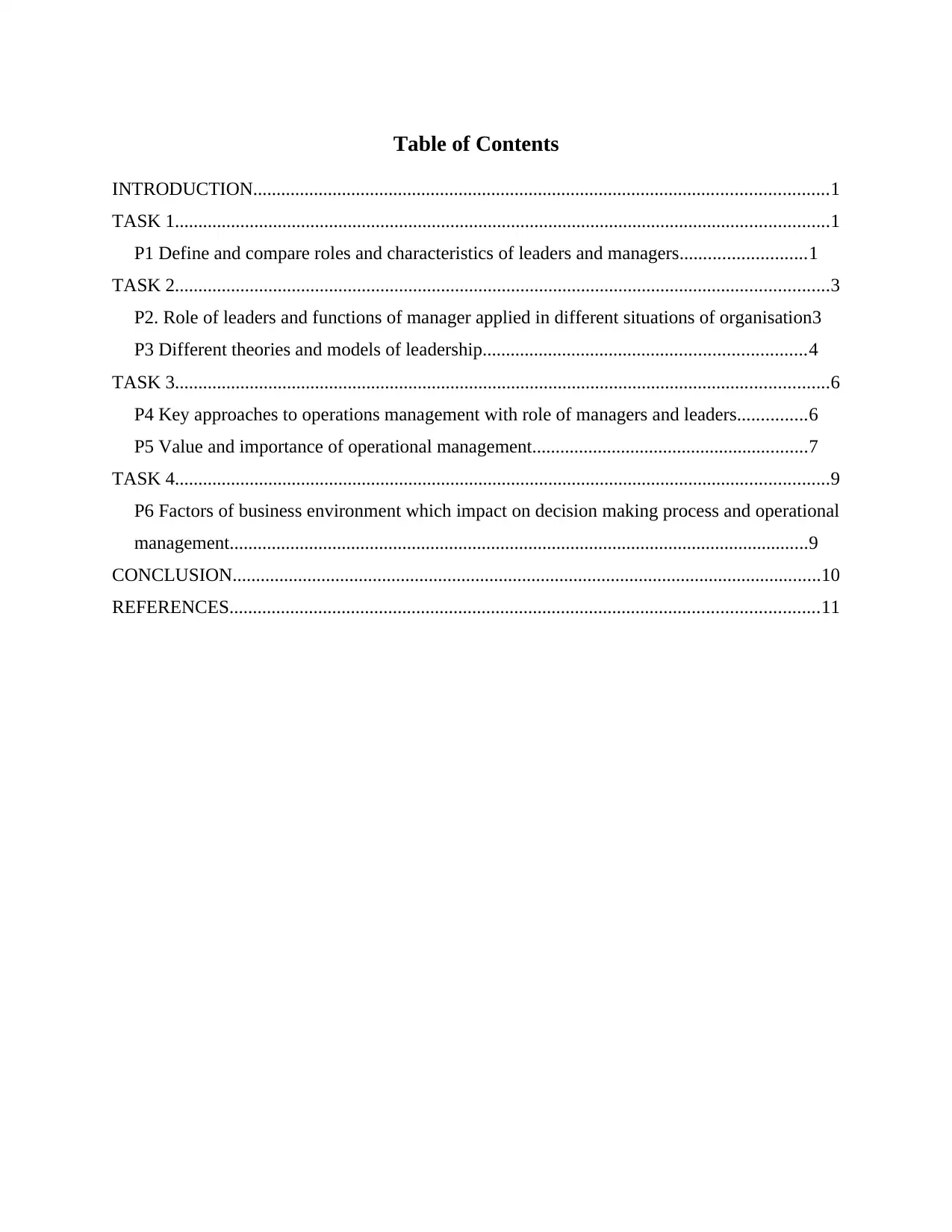
Table of Contents
INTRODUCTION...........................................................................................................................1
TASK 1............................................................................................................................................1
P1 Define and compare roles and characteristics of leaders and managers...........................1
TASK 2............................................................................................................................................3
P2. Role of leaders and functions of manager applied in different situations of organisation3
P3 Different theories and models of leadership.....................................................................4
TASK 3............................................................................................................................................6
P4 Key approaches to operations management with role of managers and leaders...............6
P5 Value and importance of operational management...........................................................7
TASK 4............................................................................................................................................9
P6 Factors of business environment which impact on decision making process and operational
management............................................................................................................................9
CONCLUSION..............................................................................................................................10
REFERENCES..............................................................................................................................11
INTRODUCTION...........................................................................................................................1
TASK 1............................................................................................................................................1
P1 Define and compare roles and characteristics of leaders and managers...........................1
TASK 2............................................................................................................................................3
P2. Role of leaders and functions of manager applied in different situations of organisation3
P3 Different theories and models of leadership.....................................................................4
TASK 3............................................................................................................................................6
P4 Key approaches to operations management with role of managers and leaders...............6
P5 Value and importance of operational management...........................................................7
TASK 4............................................................................................................................................9
P6 Factors of business environment which impact on decision making process and operational
management............................................................................................................................9
CONCLUSION..............................................................................................................................10
REFERENCES..............................................................................................................................11

⊘ This is a preview!⊘
Do you want full access?
Subscribe today to unlock all pages.

Trusted by 1+ million students worldwide
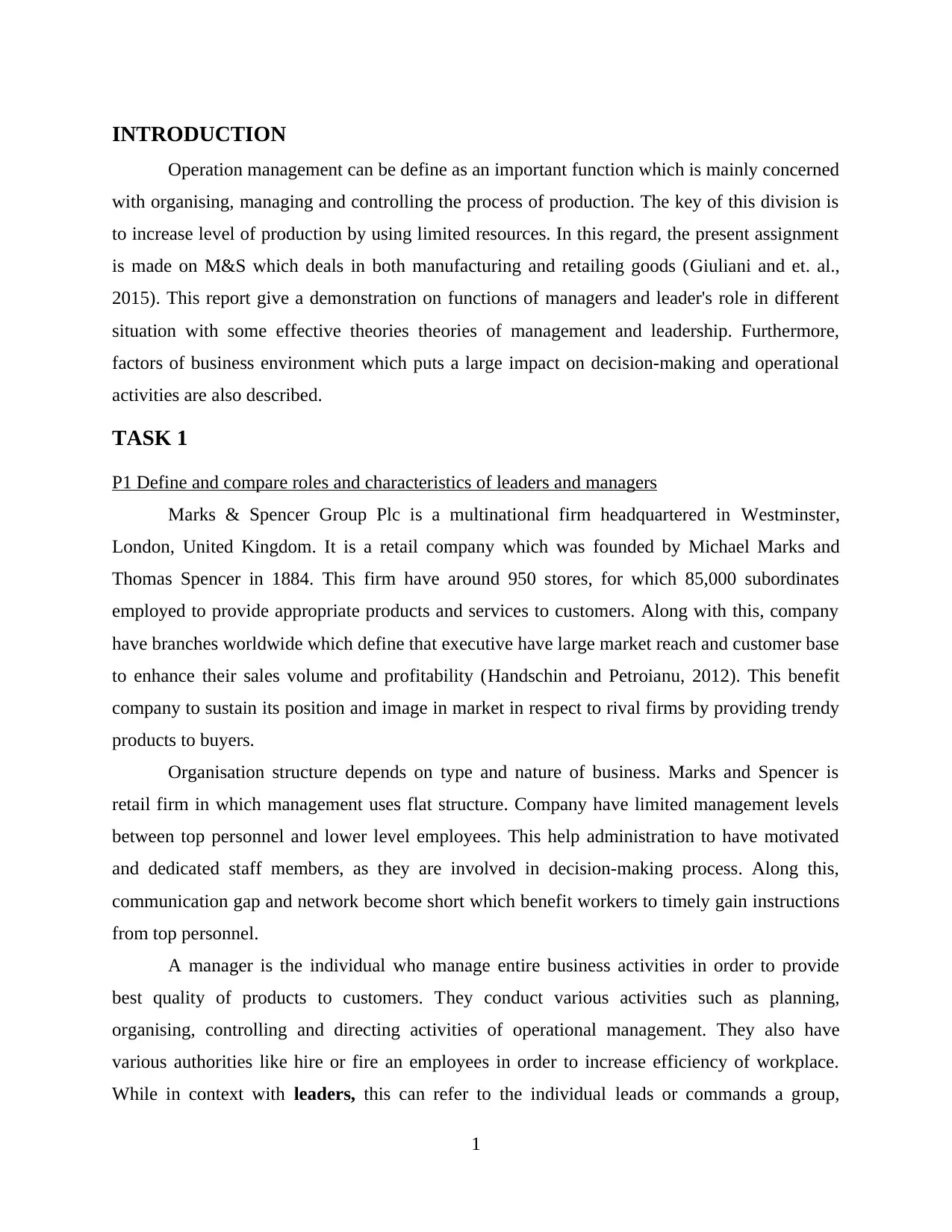
INTRODUCTION
Operation management can be define as an important function which is mainly concerned
with organising, managing and controlling the process of production. The key of this division is
to increase level of production by using limited resources. In this regard, the present assignment
is made on M&S which deals in both manufacturing and retailing goods (Giuliani and et. al.,
2015). This report give a demonstration on functions of managers and leader's role in different
situation with some effective theories theories of management and leadership. Furthermore,
factors of business environment which puts a large impact on decision-making and operational
activities are also described.
TASK 1
P1 Define and compare roles and characteristics of leaders and managers
Marks & Spencer Group Plc is a multinational firm headquartered in Westminster,
London, United Kingdom. It is a retail company which was founded by Michael Marks and
Thomas Spencer in 1884. This firm have around 950 stores, for which 85,000 subordinates
employed to provide appropriate products and services to customers. Along with this, company
have branches worldwide which define that executive have large market reach and customer base
to enhance their sales volume and profitability (Handschin and Petroianu, 2012). This benefit
company to sustain its position and image in market in respect to rival firms by providing trendy
products to buyers.
Organisation structure depends on type and nature of business. Marks and Spencer is
retail firm in which management uses flat structure. Company have limited management levels
between top personnel and lower level employees. This help administration to have motivated
and dedicated staff members, as they are involved in decision-making process. Along this,
communication gap and network become short which benefit workers to timely gain instructions
from top personnel.
A manager is the individual who manage entire business activities in order to provide
best quality of products to customers. They conduct various activities such as planning,
organising, controlling and directing activities of operational management. They also have
various authorities like hire or fire an employees in order to increase efficiency of workplace.
While in context with leaders, this can refer to the individual leads or commands a group,
1
Operation management can be define as an important function which is mainly concerned
with organising, managing and controlling the process of production. The key of this division is
to increase level of production by using limited resources. In this regard, the present assignment
is made on M&S which deals in both manufacturing and retailing goods (Giuliani and et. al.,
2015). This report give a demonstration on functions of managers and leader's role in different
situation with some effective theories theories of management and leadership. Furthermore,
factors of business environment which puts a large impact on decision-making and operational
activities are also described.
TASK 1
P1 Define and compare roles and characteristics of leaders and managers
Marks & Spencer Group Plc is a multinational firm headquartered in Westminster,
London, United Kingdom. It is a retail company which was founded by Michael Marks and
Thomas Spencer in 1884. This firm have around 950 stores, for which 85,000 subordinates
employed to provide appropriate products and services to customers. Along with this, company
have branches worldwide which define that executive have large market reach and customer base
to enhance their sales volume and profitability (Handschin and Petroianu, 2012). This benefit
company to sustain its position and image in market in respect to rival firms by providing trendy
products to buyers.
Organisation structure depends on type and nature of business. Marks and Spencer is
retail firm in which management uses flat structure. Company have limited management levels
between top personnel and lower level employees. This help administration to have motivated
and dedicated staff members, as they are involved in decision-making process. Along this,
communication gap and network become short which benefit workers to timely gain instructions
from top personnel.
A manager is the individual who manage entire business activities in order to provide
best quality of products to customers. They conduct various activities such as planning,
organising, controlling and directing activities of operational management. They also have
various authorities like hire or fire an employees in order to increase efficiency of workplace.
While in context with leaders, this can refer to the individual leads or commands a group,
1
Paraphrase This Document
Need a fresh take? Get an instant paraphrase of this document with our AI Paraphraser
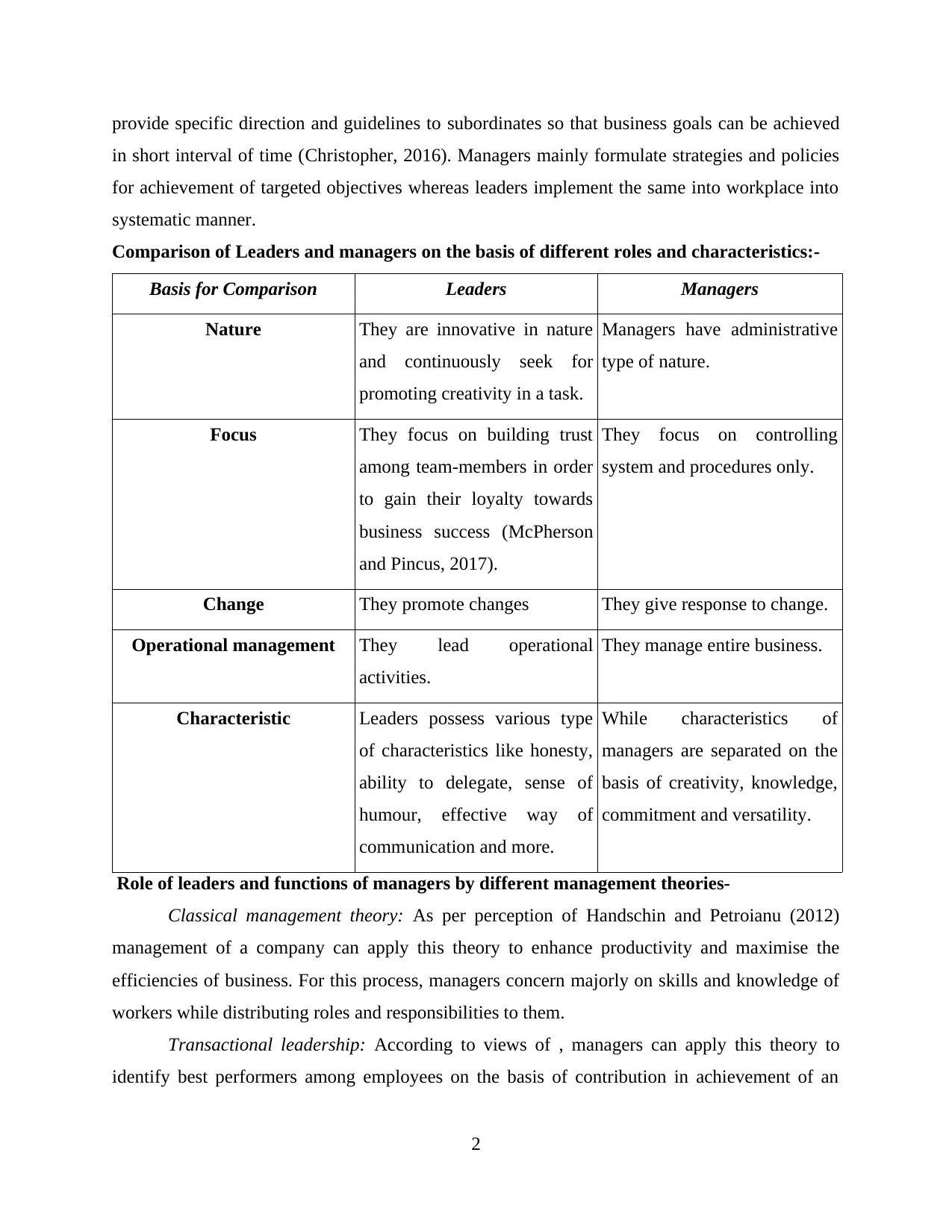
provide specific direction and guidelines to subordinates so that business goals can be achieved
in short interval of time (Christopher, 2016). Managers mainly formulate strategies and policies
for achievement of targeted objectives whereas leaders implement the same into workplace into
systematic manner.
Comparison of Leaders and managers on the basis of different roles and characteristics:-
Basis for Comparison Leaders Managers
Nature They are innovative in nature
and continuously seek for
promoting creativity in a task.
Managers have administrative
type of nature.
Focus They focus on building trust
among team-members in order
to gain their loyalty towards
business success (McPherson
and Pincus, 2017).
They focus on controlling
system and procedures only.
Change They promote changes They give response to change.
Operational management They lead operational
activities.
They manage entire business.
Characteristic Leaders possess various type
of characteristics like honesty,
ability to delegate, sense of
humour, effective way of
communication and more.
While characteristics of
managers are separated on the
basis of creativity, knowledge,
commitment and versatility.
Role of leaders and functions of managers by different management theories-
Classical management theory: As per perception of Handschin and Petroianu (2012)
management of a company can apply this theory to enhance productivity and maximise the
efficiencies of business. For this process, managers concern majorly on skills and knowledge of
workers while distributing roles and responsibilities to them.
Transactional leadership: According to views of , managers can apply this theory to
identify best performers among employees on the basis of contribution in achievement of an
2
in short interval of time (Christopher, 2016). Managers mainly formulate strategies and policies
for achievement of targeted objectives whereas leaders implement the same into workplace into
systematic manner.
Comparison of Leaders and managers on the basis of different roles and characteristics:-
Basis for Comparison Leaders Managers
Nature They are innovative in nature
and continuously seek for
promoting creativity in a task.
Managers have administrative
type of nature.
Focus They focus on building trust
among team-members in order
to gain their loyalty towards
business success (McPherson
and Pincus, 2017).
They focus on controlling
system and procedures only.
Change They promote changes They give response to change.
Operational management They lead operational
activities.
They manage entire business.
Characteristic Leaders possess various type
of characteristics like honesty,
ability to delegate, sense of
humour, effective way of
communication and more.
While characteristics of
managers are separated on the
basis of creativity, knowledge,
commitment and versatility.
Role of leaders and functions of managers by different management theories-
Classical management theory: As per perception of Handschin and Petroianu (2012)
management of a company can apply this theory to enhance productivity and maximise the
efficiencies of business. For this process, managers concern majorly on skills and knowledge of
workers while distributing roles and responsibilities to them.
Transactional leadership: According to views of , managers can apply this theory to
identify best performers among employees on the basis of contribution in achievement of an
2
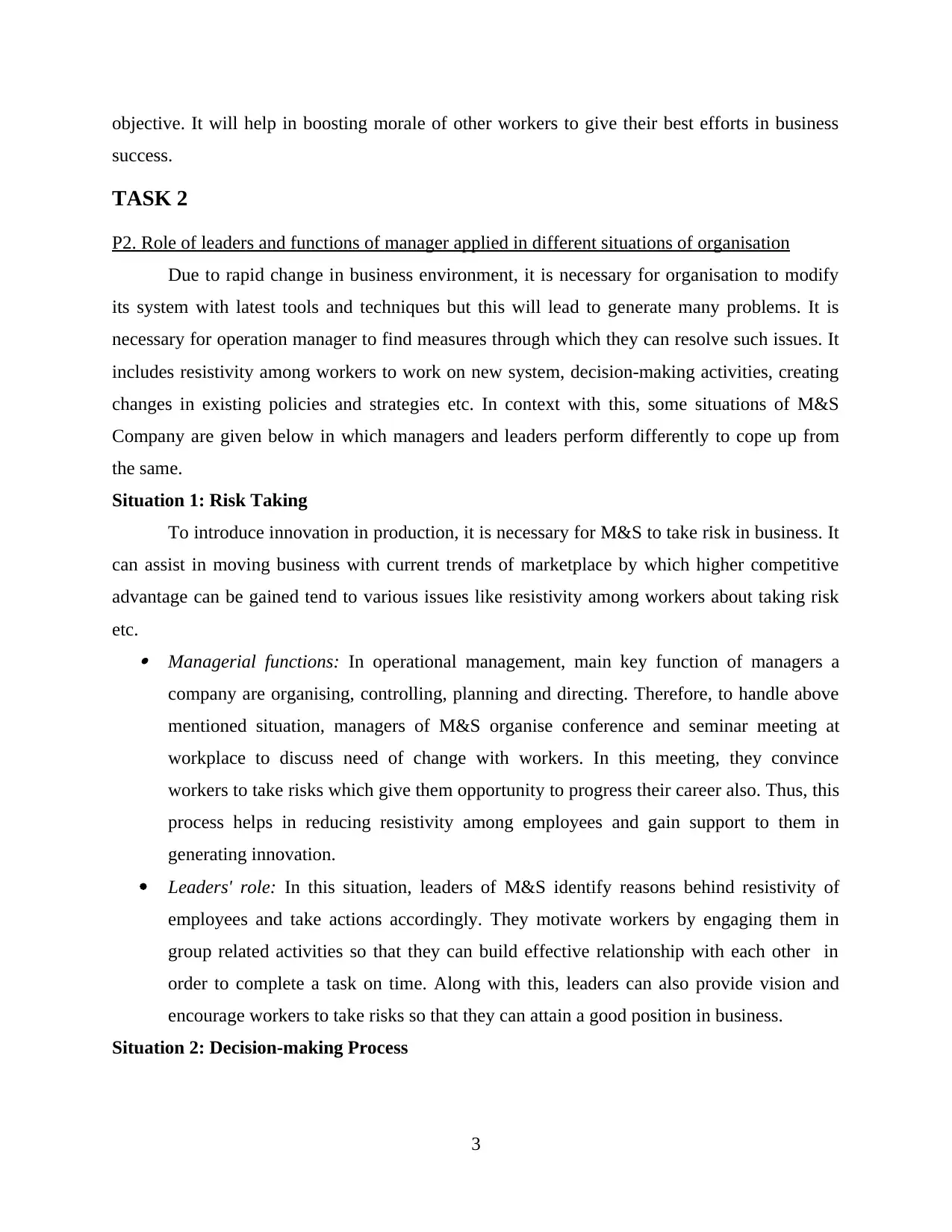
objective. It will help in boosting morale of other workers to give their best efforts in business
success.
TASK 2
P2. Role of leaders and functions of manager applied in different situations of organisation
Due to rapid change in business environment, it is necessary for organisation to modify
its system with latest tools and techniques but this will lead to generate many problems. It is
necessary for operation manager to find measures through which they can resolve such issues. It
includes resistivity among workers to work on new system, decision-making activities, creating
changes in existing policies and strategies etc. In context with this, some situations of M&S
Company are given below in which managers and leaders perform differently to cope up from
the same.
Situation 1: Risk Taking
To introduce innovation in production, it is necessary for M&S to take risk in business. It
can assist in moving business with current trends of marketplace by which higher competitive
advantage can be gained tend to various issues like resistivity among workers about taking risk
etc. Managerial functions: In operational management, main key function of managers a
company are organising, controlling, planning and directing. Therefore, to handle above
mentioned situation, managers of M&S organise conference and seminar meeting at
workplace to discuss need of change with workers. In this meeting, they convince
workers to take risks which give them opportunity to progress their career also. Thus, this
process helps in reducing resistivity among employees and gain support to them in
generating innovation.
Leaders' role: In this situation, leaders of M&S identify reasons behind resistivity of
employees and take actions accordingly. They motivate workers by engaging them in
group related activities so that they can build effective relationship with each other in
order to complete a task on time. Along with this, leaders can also provide vision and
encourage workers to take risks so that they can attain a good position in business.
Situation 2: Decision-making Process
3
success.
TASK 2
P2. Role of leaders and functions of manager applied in different situations of organisation
Due to rapid change in business environment, it is necessary for organisation to modify
its system with latest tools and techniques but this will lead to generate many problems. It is
necessary for operation manager to find measures through which they can resolve such issues. It
includes resistivity among workers to work on new system, decision-making activities, creating
changes in existing policies and strategies etc. In context with this, some situations of M&S
Company are given below in which managers and leaders perform differently to cope up from
the same.
Situation 1: Risk Taking
To introduce innovation in production, it is necessary for M&S to take risk in business. It
can assist in moving business with current trends of marketplace by which higher competitive
advantage can be gained tend to various issues like resistivity among workers about taking risk
etc. Managerial functions: In operational management, main key function of managers a
company are organising, controlling, planning and directing. Therefore, to handle above
mentioned situation, managers of M&S organise conference and seminar meeting at
workplace to discuss need of change with workers. In this meeting, they convince
workers to take risks which give them opportunity to progress their career also. Thus, this
process helps in reducing resistivity among employees and gain support to them in
generating innovation.
Leaders' role: In this situation, leaders of M&S identify reasons behind resistivity of
employees and take actions accordingly. They motivate workers by engaging them in
group related activities so that they can build effective relationship with each other in
order to complete a task on time. Along with this, leaders can also provide vision and
encourage workers to take risks so that they can attain a good position in business.
Situation 2: Decision-making Process
3
⊘ This is a preview!⊘
Do you want full access?
Subscribe today to unlock all pages.

Trusted by 1+ million students worldwide
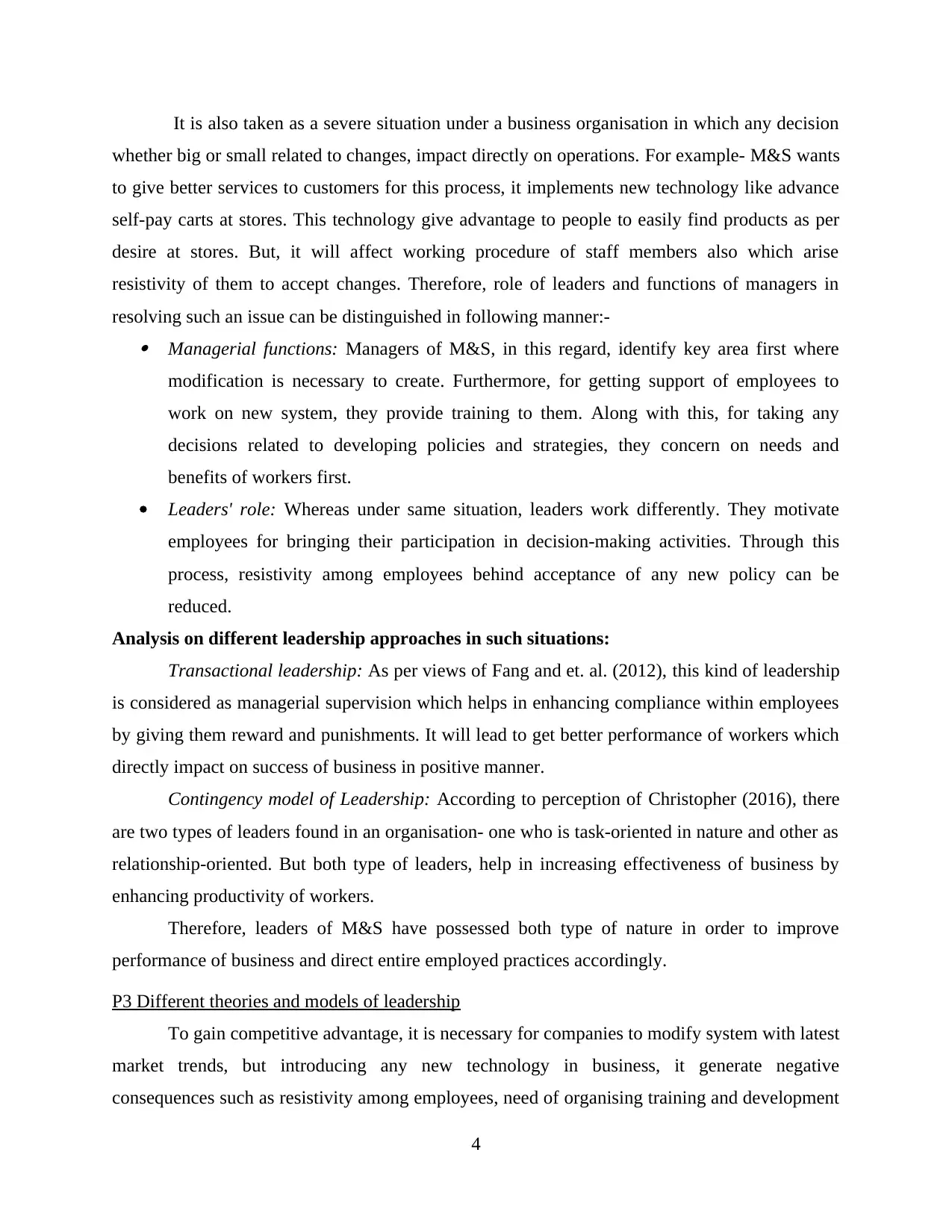
It is also taken as a severe situation under a business organisation in which any decision
whether big or small related to changes, impact directly on operations. For example- M&S wants
to give better services to customers for this process, it implements new technology like advance
self-pay carts at stores. This technology give advantage to people to easily find products as per
desire at stores. But, it will affect working procedure of staff members also which arise
resistivity of them to accept changes. Therefore, role of leaders and functions of managers in
resolving such an issue can be distinguished in following manner:- Managerial functions: Managers of M&S, in this regard, identify key area first where
modification is necessary to create. Furthermore, for getting support of employees to
work on new system, they provide training to them. Along with this, for taking any
decisions related to developing policies and strategies, they concern on needs and
benefits of workers first.
Leaders' role: Whereas under same situation, leaders work differently. They motivate
employees for bringing their participation in decision-making activities. Through this
process, resistivity among employees behind acceptance of any new policy can be
reduced.
Analysis on different leadership approaches in such situations:
Transactional leadership: As per views of Fang and et. al. (2012), this kind of leadership
is considered as managerial supervision which helps in enhancing compliance within employees
by giving them reward and punishments. It will lead to get better performance of workers which
directly impact on success of business in positive manner.
Contingency model of Leadership: According to perception of Christopher (2016), there
are two types of leaders found in an organisation- one who is task-oriented in nature and other as
relationship-oriented. But both type of leaders, help in increasing effectiveness of business by
enhancing productivity of workers.
Therefore, leaders of M&S have possessed both type of nature in order to improve
performance of business and direct entire employed practices accordingly.
P3 Different theories and models of leadership
To gain competitive advantage, it is necessary for companies to modify system with latest
market trends, but introducing any new technology in business, it generate negative
consequences such as resistivity among employees, need of organising training and development
4
whether big or small related to changes, impact directly on operations. For example- M&S wants
to give better services to customers for this process, it implements new technology like advance
self-pay carts at stores. This technology give advantage to people to easily find products as per
desire at stores. But, it will affect working procedure of staff members also which arise
resistivity of them to accept changes. Therefore, role of leaders and functions of managers in
resolving such an issue can be distinguished in following manner:- Managerial functions: Managers of M&S, in this regard, identify key area first where
modification is necessary to create. Furthermore, for getting support of employees to
work on new system, they provide training to them. Along with this, for taking any
decisions related to developing policies and strategies, they concern on needs and
benefits of workers first.
Leaders' role: Whereas under same situation, leaders work differently. They motivate
employees for bringing their participation in decision-making activities. Through this
process, resistivity among employees behind acceptance of any new policy can be
reduced.
Analysis on different leadership approaches in such situations:
Transactional leadership: As per views of Fang and et. al. (2012), this kind of leadership
is considered as managerial supervision which helps in enhancing compliance within employees
by giving them reward and punishments. It will lead to get better performance of workers which
directly impact on success of business in positive manner.
Contingency model of Leadership: According to perception of Christopher (2016), there
are two types of leaders found in an organisation- one who is task-oriented in nature and other as
relationship-oriented. But both type of leaders, help in increasing effectiveness of business by
enhancing productivity of workers.
Therefore, leaders of M&S have possessed both type of nature in order to improve
performance of business and direct entire employed practices accordingly.
P3 Different theories and models of leadership
To gain competitive advantage, it is necessary for companies to modify system with latest
market trends, but introducing any new technology in business, it generate negative
consequences such as resistivity among employees, need of organising training and development
4
Paraphrase This Document
Need a fresh take? Get an instant paraphrase of this document with our AI Paraphraser
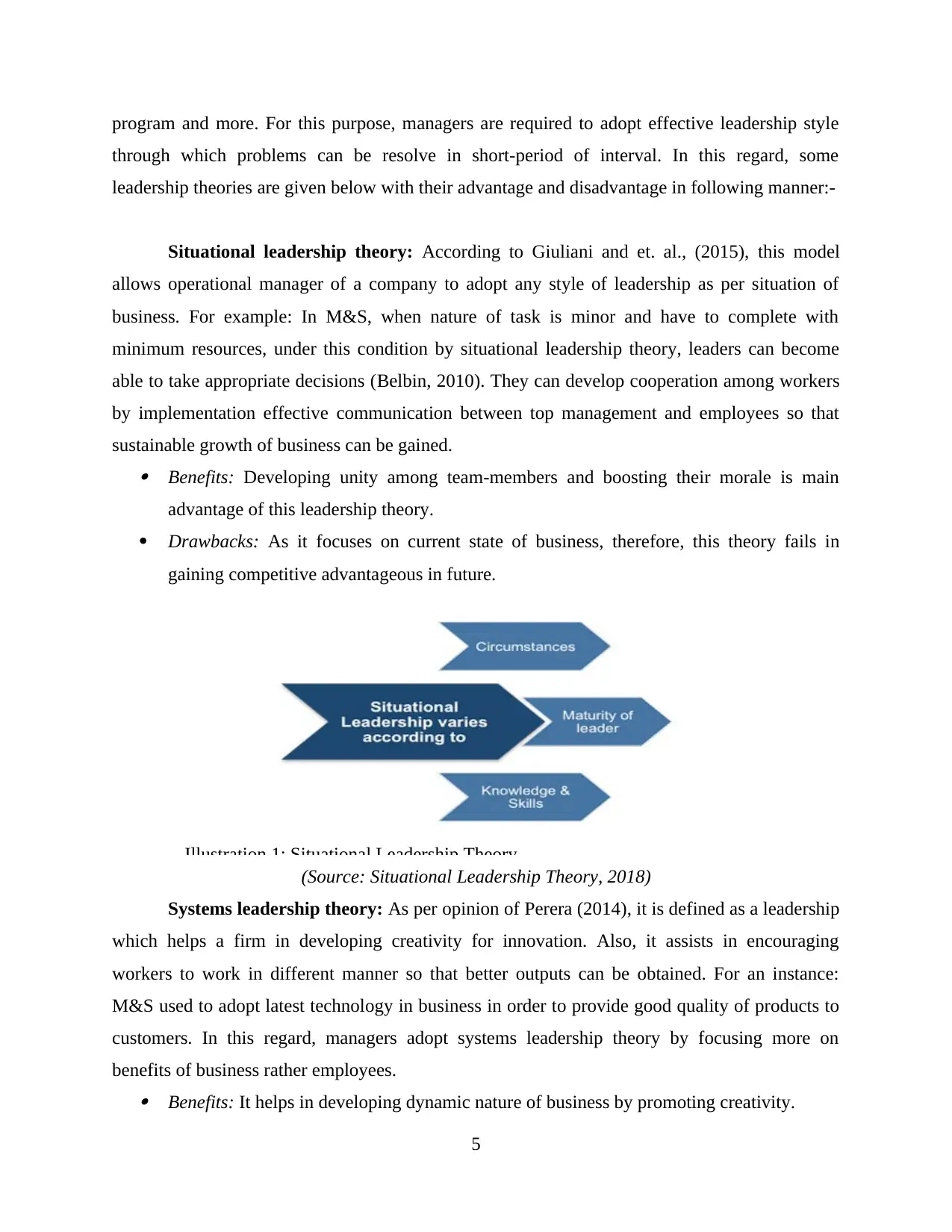
program and more. For this purpose, managers are required to adopt effective leadership style
through which problems can be resolve in short-period of interval. In this regard, some
leadership theories are given below with their advantage and disadvantage in following manner:-
Situational leadership theory: According to Giuliani and et. al., (2015), this model
allows operational manager of a company to adopt any style of leadership as per situation of
business. For example: In M&S, when nature of task is minor and have to complete with
minimum resources, under this condition by situational leadership theory, leaders can become
able to take appropriate decisions (Belbin, 2010). They can develop cooperation among workers
by implementation effective communication between top management and employees so that
sustainable growth of business can be gained. Benefits: Developing unity among team-members and boosting their morale is main
advantage of this leadership theory.
Drawbacks: As it focuses on current state of business, therefore, this theory fails in
gaining competitive advantageous in future.
(Source: Situational Leadership Theory, 2018)
Systems leadership theory: As per opinion of Perera (2014), it is defined as a leadership
which helps a firm in developing creativity for innovation. Also, it assists in encouraging
workers to work in different manner so that better outputs can be obtained. For an instance:
M&S used to adopt latest technology in business in order to provide good quality of products to
customers. In this regard, managers adopt systems leadership theory by focusing more on
benefits of business rather employees. Benefits: It helps in developing dynamic nature of business by promoting creativity.
5
Illustration 1: Situational Leadership Theory
through which problems can be resolve in short-period of interval. In this regard, some
leadership theories are given below with their advantage and disadvantage in following manner:-
Situational leadership theory: According to Giuliani and et. al., (2015), this model
allows operational manager of a company to adopt any style of leadership as per situation of
business. For example: In M&S, when nature of task is minor and have to complete with
minimum resources, under this condition by situational leadership theory, leaders can become
able to take appropriate decisions (Belbin, 2010). They can develop cooperation among workers
by implementation effective communication between top management and employees so that
sustainable growth of business can be gained. Benefits: Developing unity among team-members and boosting their morale is main
advantage of this leadership theory.
Drawbacks: As it focuses on current state of business, therefore, this theory fails in
gaining competitive advantageous in future.
(Source: Situational Leadership Theory, 2018)
Systems leadership theory: As per opinion of Perera (2014), it is defined as a leadership
which helps a firm in developing creativity for innovation. Also, it assists in encouraging
workers to work in different manner so that better outputs can be obtained. For an instance:
M&S used to adopt latest technology in business in order to provide good quality of products to
customers. In this regard, managers adopt systems leadership theory by focusing more on
benefits of business rather employees. Benefits: It helps in developing dynamic nature of business by promoting creativity.
5
Illustration 1: Situational Leadership Theory
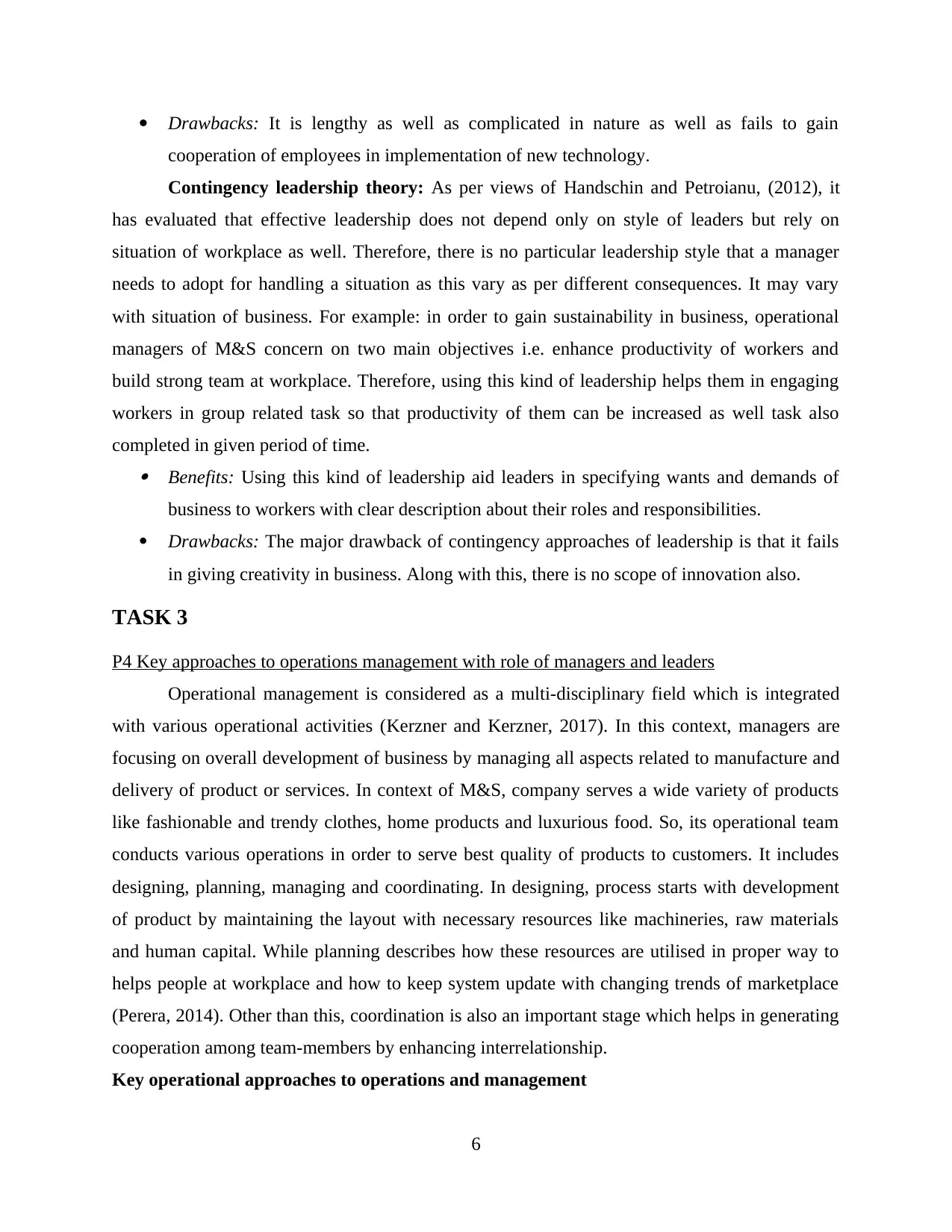
Drawbacks: It is lengthy as well as complicated in nature as well as fails to gain
cooperation of employees in implementation of new technology.
Contingency leadership theory: As per views of Handschin and Petroianu, (2012), it
has evaluated that effective leadership does not depend only on style of leaders but rely on
situation of workplace as well. Therefore, there is no particular leadership style that a manager
needs to adopt for handling a situation as this vary as per different consequences. It may vary
with situation of business. For example: in order to gain sustainability in business, operational
managers of M&S concern on two main objectives i.e. enhance productivity of workers and
build strong team at workplace. Therefore, using this kind of leadership helps them in engaging
workers in group related task so that productivity of them can be increased as well task also
completed in given period of time. Benefits: Using this kind of leadership aid leaders in specifying wants and demands of
business to workers with clear description about their roles and responsibilities.
Drawbacks: The major drawback of contingency approaches of leadership is that it fails
in giving creativity in business. Along with this, there is no scope of innovation also.
TASK 3
P4 Key approaches to operations management with role of managers and leaders
Operational management is considered as a multi-disciplinary field which is integrated
with various operational activities (Kerzner and Kerzner, 2017). In this context, managers are
focusing on overall development of business by managing all aspects related to manufacture and
delivery of product or services. In context of M&S, company serves a wide variety of products
like fashionable and trendy clothes, home products and luxurious food. So, its operational team
conducts various operations in order to serve best quality of products to customers. It includes
designing, planning, managing and coordinating. In designing, process starts with development
of product by maintaining the layout with necessary resources like machineries, raw materials
and human capital. While planning describes how these resources are utilised in proper way to
helps people at workplace and how to keep system update with changing trends of marketplace
(Perera, 2014). Other than this, coordination is also an important stage which helps in generating
cooperation among team-members by enhancing interrelationship.
Key operational approaches to operations and management
6
cooperation of employees in implementation of new technology.
Contingency leadership theory: As per views of Handschin and Petroianu, (2012), it
has evaluated that effective leadership does not depend only on style of leaders but rely on
situation of workplace as well. Therefore, there is no particular leadership style that a manager
needs to adopt for handling a situation as this vary as per different consequences. It may vary
with situation of business. For example: in order to gain sustainability in business, operational
managers of M&S concern on two main objectives i.e. enhance productivity of workers and
build strong team at workplace. Therefore, using this kind of leadership helps them in engaging
workers in group related task so that productivity of them can be increased as well task also
completed in given period of time. Benefits: Using this kind of leadership aid leaders in specifying wants and demands of
business to workers with clear description about their roles and responsibilities.
Drawbacks: The major drawback of contingency approaches of leadership is that it fails
in giving creativity in business. Along with this, there is no scope of innovation also.
TASK 3
P4 Key approaches to operations management with role of managers and leaders
Operational management is considered as a multi-disciplinary field which is integrated
with various operational activities (Kerzner and Kerzner, 2017). In this context, managers are
focusing on overall development of business by managing all aspects related to manufacture and
delivery of product or services. In context of M&S, company serves a wide variety of products
like fashionable and trendy clothes, home products and luxurious food. So, its operational team
conducts various operations in order to serve best quality of products to customers. It includes
designing, planning, managing and coordinating. In designing, process starts with development
of product by maintaining the layout with necessary resources like machineries, raw materials
and human capital. While planning describes how these resources are utilised in proper way to
helps people at workplace and how to keep system update with changing trends of marketplace
(Perera, 2014). Other than this, coordination is also an important stage which helps in generating
cooperation among team-members by enhancing interrelationship.
Key operational approaches to operations and management
6
⊘ This is a preview!⊘
Do you want full access?
Subscribe today to unlock all pages.

Trusted by 1+ million students worldwide
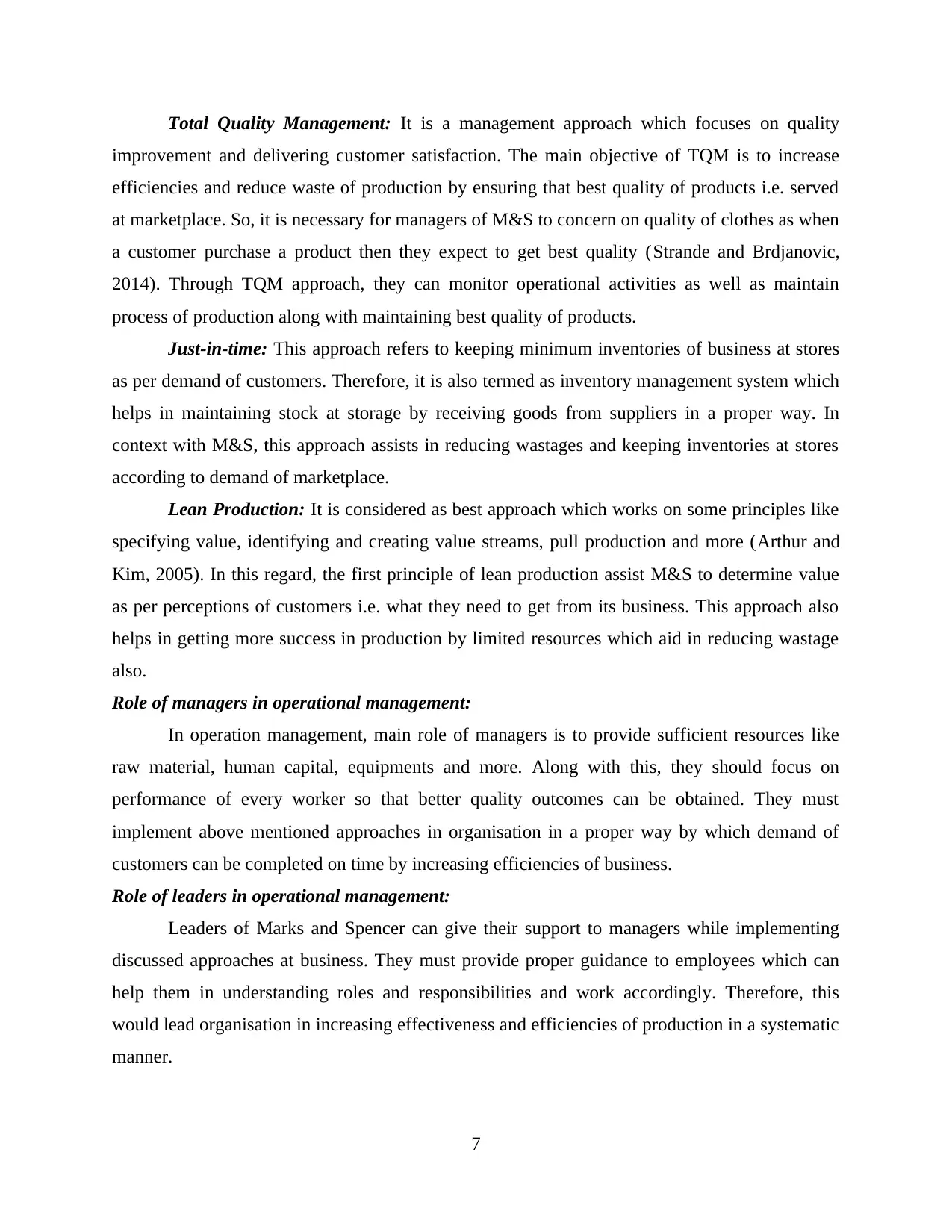
Total Quality Management: It is a management approach which focuses on quality
improvement and delivering customer satisfaction. The main objective of TQM is to increase
efficiencies and reduce waste of production by ensuring that best quality of products i.e. served
at marketplace. So, it is necessary for managers of M&S to concern on quality of clothes as when
a customer purchase a product then they expect to get best quality (Strande and Brdjanovic,
2014). Through TQM approach, they can monitor operational activities as well as maintain
process of production along with maintaining best quality of products.
Just-in-time: This approach refers to keeping minimum inventories of business at stores
as per demand of customers. Therefore, it is also termed as inventory management system which
helps in maintaining stock at storage by receiving goods from suppliers in a proper way. In
context with M&S, this approach assists in reducing wastages and keeping inventories at stores
according to demand of marketplace.
Lean Production: It is considered as best approach which works on some principles like
specifying value, identifying and creating value streams, pull production and more (Arthur and
Kim, 2005). In this regard, the first principle of lean production assist M&S to determine value
as per perceptions of customers i.e. what they need to get from its business. This approach also
helps in getting more success in production by limited resources which aid in reducing wastage
also.
Role of managers in operational management:
In operation management, main role of managers is to provide sufficient resources like
raw material, human capital, equipments and more. Along with this, they should focus on
performance of every worker so that better quality outcomes can be obtained. They must
implement above mentioned approaches in organisation in a proper way by which demand of
customers can be completed on time by increasing efficiencies of business.
Role of leaders in operational management:
Leaders of Marks and Spencer can give their support to managers while implementing
discussed approaches at business. They must provide proper guidance to employees which can
help them in understanding roles and responsibilities and work accordingly. Therefore, this
would lead organisation in increasing effectiveness and efficiencies of production in a systematic
manner.
7
improvement and delivering customer satisfaction. The main objective of TQM is to increase
efficiencies and reduce waste of production by ensuring that best quality of products i.e. served
at marketplace. So, it is necessary for managers of M&S to concern on quality of clothes as when
a customer purchase a product then they expect to get best quality (Strande and Brdjanovic,
2014). Through TQM approach, they can monitor operational activities as well as maintain
process of production along with maintaining best quality of products.
Just-in-time: This approach refers to keeping minimum inventories of business at stores
as per demand of customers. Therefore, it is also termed as inventory management system which
helps in maintaining stock at storage by receiving goods from suppliers in a proper way. In
context with M&S, this approach assists in reducing wastages and keeping inventories at stores
according to demand of marketplace.
Lean Production: It is considered as best approach which works on some principles like
specifying value, identifying and creating value streams, pull production and more (Arthur and
Kim, 2005). In this regard, the first principle of lean production assist M&S to determine value
as per perceptions of customers i.e. what they need to get from its business. This approach also
helps in getting more success in production by limited resources which aid in reducing wastage
also.
Role of managers in operational management:
In operation management, main role of managers is to provide sufficient resources like
raw material, human capital, equipments and more. Along with this, they should focus on
performance of every worker so that better quality outcomes can be obtained. They must
implement above mentioned approaches in organisation in a proper way by which demand of
customers can be completed on time by increasing efficiencies of business.
Role of leaders in operational management:
Leaders of Marks and Spencer can give their support to managers while implementing
discussed approaches at business. They must provide proper guidance to employees which can
help them in understanding roles and responsibilities and work accordingly. Therefore, this
would lead organisation in increasing effectiveness and efficiencies of production in a systematic
manner.
7
Paraphrase This Document
Need a fresh take? Get an instant paraphrase of this document with our AI Paraphraser
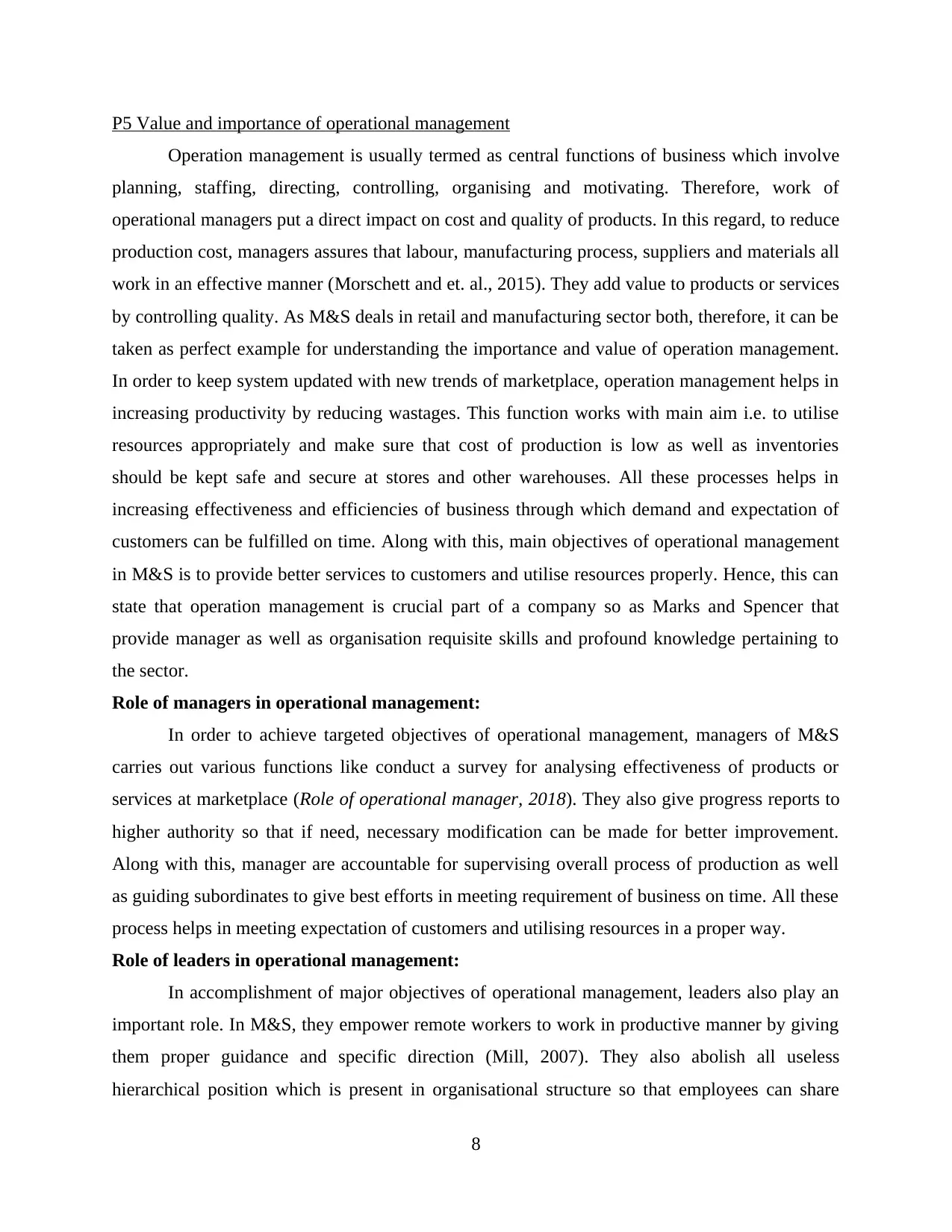
P5 Value and importance of operational management
Operation management is usually termed as central functions of business which involve
planning, staffing, directing, controlling, organising and motivating. Therefore, work of
operational managers put a direct impact on cost and quality of products. In this regard, to reduce
production cost, managers assures that labour, manufacturing process, suppliers and materials all
work in an effective manner (Morschett and et. al., 2015). They add value to products or services
by controlling quality. As M&S deals in retail and manufacturing sector both, therefore, it can be
taken as perfect example for understanding the importance and value of operation management.
In order to keep system updated with new trends of marketplace, operation management helps in
increasing productivity by reducing wastages. This function works with main aim i.e. to utilise
resources appropriately and make sure that cost of production is low as well as inventories
should be kept safe and secure at stores and other warehouses. All these processes helps in
increasing effectiveness and efficiencies of business through which demand and expectation of
customers can be fulfilled on time. Along with this, main objectives of operational management
in M&S is to provide better services to customers and utilise resources properly. Hence, this can
state that operation management is crucial part of a company so as Marks and Spencer that
provide manager as well as organisation requisite skills and profound knowledge pertaining to
the sector.
Role of managers in operational management:
In order to achieve targeted objectives of operational management, managers of M&S
carries out various functions like conduct a survey for analysing effectiveness of products or
services at marketplace (Role of operational manager, 2018). They also give progress reports to
higher authority so that if need, necessary modification can be made for better improvement.
Along with this, manager are accountable for supervising overall process of production as well
as guiding subordinates to give best efforts in meeting requirement of business on time. All these
process helps in meeting expectation of customers and utilising resources in a proper way.
Role of leaders in operational management:
In accomplishment of major objectives of operational management, leaders also play an
important role. In M&S, they empower remote workers to work in productive manner by giving
them proper guidance and specific direction (Mill, 2007). They also abolish all useless
hierarchical position which is present in organisational structure so that employees can share
8
Operation management is usually termed as central functions of business which involve
planning, staffing, directing, controlling, organising and motivating. Therefore, work of
operational managers put a direct impact on cost and quality of products. In this regard, to reduce
production cost, managers assures that labour, manufacturing process, suppliers and materials all
work in an effective manner (Morschett and et. al., 2015). They add value to products or services
by controlling quality. As M&S deals in retail and manufacturing sector both, therefore, it can be
taken as perfect example for understanding the importance and value of operation management.
In order to keep system updated with new trends of marketplace, operation management helps in
increasing productivity by reducing wastages. This function works with main aim i.e. to utilise
resources appropriately and make sure that cost of production is low as well as inventories
should be kept safe and secure at stores and other warehouses. All these processes helps in
increasing effectiveness and efficiencies of business through which demand and expectation of
customers can be fulfilled on time. Along with this, main objectives of operational management
in M&S is to provide better services to customers and utilise resources properly. Hence, this can
state that operation management is crucial part of a company so as Marks and Spencer that
provide manager as well as organisation requisite skills and profound knowledge pertaining to
the sector.
Role of managers in operational management:
In order to achieve targeted objectives of operational management, managers of M&S
carries out various functions like conduct a survey for analysing effectiveness of products or
services at marketplace (Role of operational manager, 2018). They also give progress reports to
higher authority so that if need, necessary modification can be made for better improvement.
Along with this, manager are accountable for supervising overall process of production as well
as guiding subordinates to give best efforts in meeting requirement of business on time. All these
process helps in meeting expectation of customers and utilising resources in a proper way.
Role of leaders in operational management:
In accomplishment of major objectives of operational management, leaders also play an
important role. In M&S, they empower remote workers to work in productive manner by giving
them proper guidance and specific direction (Mill, 2007). They also abolish all useless
hierarchical position which is present in organisational structure so that employees can share
8
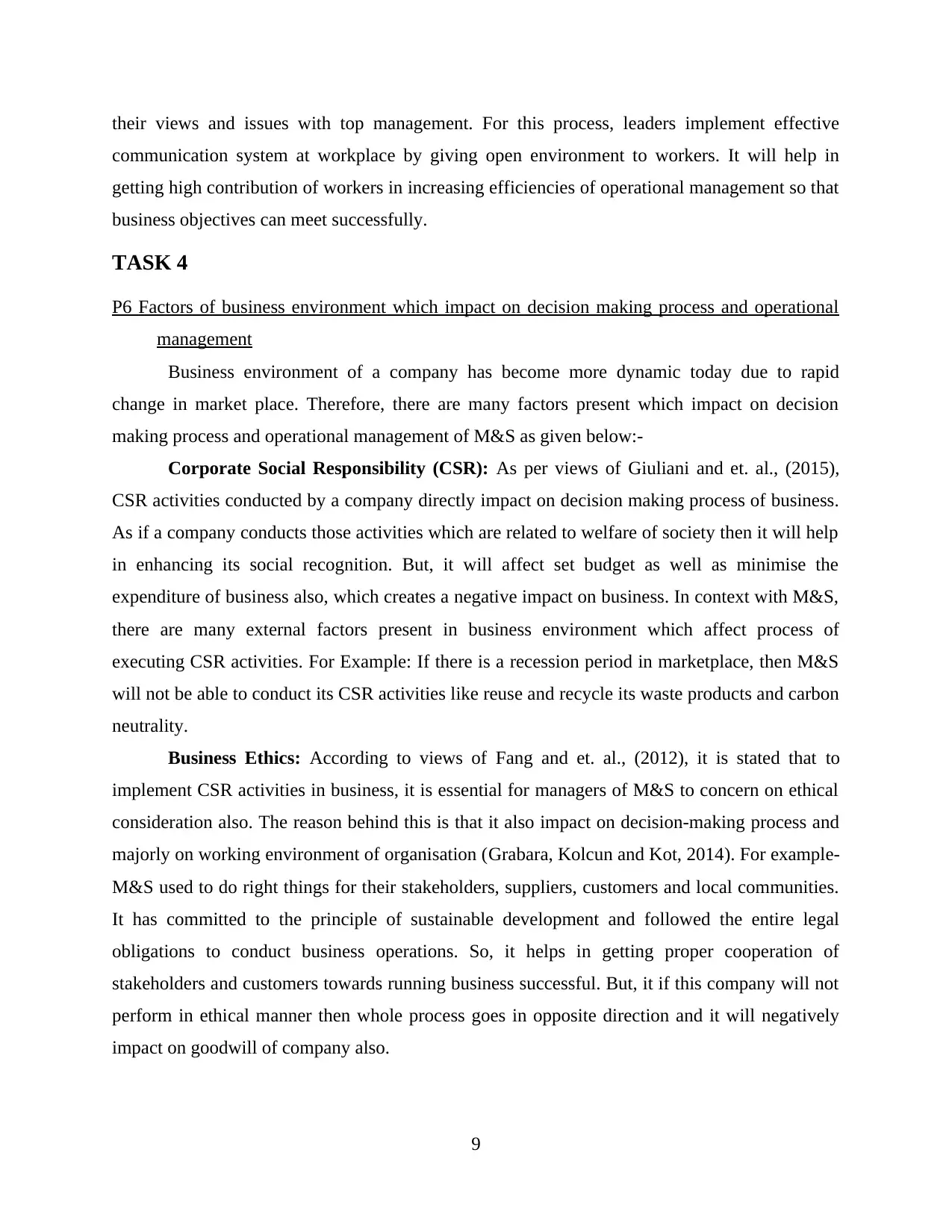
their views and issues with top management. For this process, leaders implement effective
communication system at workplace by giving open environment to workers. It will help in
getting high contribution of workers in increasing efficiencies of operational management so that
business objectives can meet successfully.
TASK 4
P6 Factors of business environment which impact on decision making process and operational
management
Business environment of a company has become more dynamic today due to rapid
change in market place. Therefore, there are many factors present which impact on decision
making process and operational management of M&S as given below:-
Corporate Social Responsibility (CSR): As per views of Giuliani and et. al., (2015),
CSR activities conducted by a company directly impact on decision making process of business.
As if a company conducts those activities which are related to welfare of society then it will help
in enhancing its social recognition. But, it will affect set budget as well as minimise the
expenditure of business also, which creates a negative impact on business. In context with M&S,
there are many external factors present in business environment which affect process of
executing CSR activities. For Example: If there is a recession period in marketplace, then M&S
will not be able to conduct its CSR activities like reuse and recycle its waste products and carbon
neutrality.
Business Ethics: According to views of Fang and et. al., (2012), it is stated that to
implement CSR activities in business, it is essential for managers of M&S to concern on ethical
consideration also. The reason behind this is that it also impact on decision-making process and
majorly on working environment of organisation (Grabara, Kolcun and Kot, 2014). For example-
M&S used to do right things for their stakeholders, suppliers, customers and local communities.
It has committed to the principle of sustainable development and followed the entire legal
obligations to conduct business operations. So, it helps in getting proper cooperation of
stakeholders and customers towards running business successful. But, it if this company will not
perform in ethical manner then whole process goes in opposite direction and it will negatively
impact on goodwill of company also.
9
communication system at workplace by giving open environment to workers. It will help in
getting high contribution of workers in increasing efficiencies of operational management so that
business objectives can meet successfully.
TASK 4
P6 Factors of business environment which impact on decision making process and operational
management
Business environment of a company has become more dynamic today due to rapid
change in market place. Therefore, there are many factors present which impact on decision
making process and operational management of M&S as given below:-
Corporate Social Responsibility (CSR): As per views of Giuliani and et. al., (2015),
CSR activities conducted by a company directly impact on decision making process of business.
As if a company conducts those activities which are related to welfare of society then it will help
in enhancing its social recognition. But, it will affect set budget as well as minimise the
expenditure of business also, which creates a negative impact on business. In context with M&S,
there are many external factors present in business environment which affect process of
executing CSR activities. For Example: If there is a recession period in marketplace, then M&S
will not be able to conduct its CSR activities like reuse and recycle its waste products and carbon
neutrality.
Business Ethics: According to views of Fang and et. al., (2012), it is stated that to
implement CSR activities in business, it is essential for managers of M&S to concern on ethical
consideration also. The reason behind this is that it also impact on decision-making process and
majorly on working environment of organisation (Grabara, Kolcun and Kot, 2014). For example-
M&S used to do right things for their stakeholders, suppliers, customers and local communities.
It has committed to the principle of sustainable development and followed the entire legal
obligations to conduct business operations. So, it helps in getting proper cooperation of
stakeholders and customers towards running business successful. But, it if this company will not
perform in ethical manner then whole process goes in opposite direction and it will negatively
impact on goodwill of company also.
9
⊘ This is a preview!⊘
Do you want full access?
Subscribe today to unlock all pages.

Trusted by 1+ million students worldwide
1 out of 14
Related Documents
Your All-in-One AI-Powered Toolkit for Academic Success.
+13062052269
info@desklib.com
Available 24*7 on WhatsApp / Email
![[object Object]](/_next/static/media/star-bottom.7253800d.svg)
Unlock your academic potential
Copyright © 2020–2026 A2Z Services. All Rights Reserved. Developed and managed by ZUCOL.





